
 |
|
|
|
Now this is an interesting war movie, in terms of showing how productions in the 1950s revolved around big stars. It clearly began with the involvement of the very liberal, very bankable Gregory Peck. His producer associate Sy Bartlett was the author of Peck's earlier Twelve O'Clock High and was a screenwriter on that movie as well as Peck's The Big Country and Beloved Infidel. Bartlett would later produce the excellent Peck picture Cape Fear, but also author the hopelessly inept Che! Screenwriter James R. Webb worked on The Big Country as well and has a score of near classics to his name, like Vera Cruz, Apache and Trapeze. Director Lewis Milestone is best known for his film adaption of All Quiet on the Western Front, still the finest 'pacifist' war movie on the books. His late-career war movie Pork Chop Hill would at first seem to be a hawk's view of the Korean Police Action, but it's also an honest look at the dilemma of the modern soldier, fighting an unclear mission with inadequate support. Even the New York Times noted the resentment the combat soldiers feel for their own leaders in this picture. 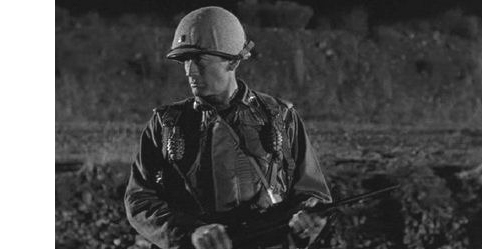
Pork Chop Hill is often praised for its excellent cast of familiar faces, well used. The film's a regular star spotting quiz -- every young male actor capable of hefting an M-1 seems to have gotten the call for this show. April, 1953. Lt. Joe Clemons (Gregory Peck) is in an awful bind. With a ceasefire pact expected momentarily from the truce talks at Panmunjom, his men wait to be pulled back. They're instead ordered to counter-attack to re-take a high ground called Pork Chop Hill, which has changed hands several times during the conflict. Clemons rallies his men and seizes the position, only for the North Koreans -- and Chinese -- to throw a massive force against them. Worse, no matter how clearly Clemons explains his dire situation, reinforcements are not committed. In fact, the few units that do join them aren't even aware of the desperate urgency of the matter. For five days, a single company holds out against two divisions of regular Chinese Army troops. At one point Clemens' force is reduced to just 25 men. The ordeal is made worse by politics -- each side at the truce talks wants to bargain from a militarily superior position. One of the better combat films, Pork Chop Hill acknowledges the difference between Korea and WW2 that movies made earlier did not. The troops aren't fighting to crush a foe or seize the enemy capital; the UN politicians somehow expect the opposing side to cry Uncle and submit to the overwhelming force of the international forces. Thus good officers like Lt. Clemons fight desperate battles and suffer heavy losses, only for their own leaders to ask them to give back the territory they've taken for political reasons. The Americans know they're not fighting to win in the old sense. In reality there was a real Lt. Clemons, two years out of West Point. He held Pork Chop Hill several days until he was relieved. Not much later, the UN conceded abandoned the hill to the Chinese forces as part of their negotiations. 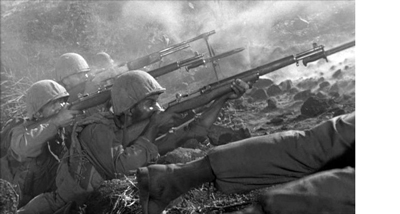
Pork Chop Hill seems an insane fight, with its now-iconic images of a lonely string of exhausted GIs facing hordes of Chinese troops, advancing like a wave in the black of night. The combat scenes are credible enough. Milestone reuses his famous signature camera move from All Quiet on the Western Front back in 1930, a fast sideways camera truck along a trench as troops advance and are shot down. The move was originally meant to represent the factory-killing effect of the machine gun; in All Quiet it's if we're looking down a gun barrel as soldiers fall like stitches laid down by a sewing machine needle. By the time of WW2 the visual was no longer shocking; Milestone used the same trucking shots in his movie Edge of Darkness just to raise the excitement level. The Pork Chop Hill situation is like All Quiet in that both conflicts are about trench warfare. This time we're the ones mowing down seemingly inexhaustible supplies of enemy troops. The idea that victory could always be ours as long as we have the best guns 'n' ammo comes from this 'faith in firepower' credo. That was certainly our mindset going into Vietnam. We hear some dialogue nods toward other nationalities fighting, but we really only see U.S. troops. Korea looks like WW2 reheated and served up in the most inhospitable battle theater imaginable. Gregory Peck is perhaps ten years too old for the part, but he still comes across well as the frustrated Lt. in charge. If Peck's Clemons were any more distrustful of the higher command, the movie might end up seeming too critical of the military. Yet the film shows us that the higher command is in the same bind, with too many diplomats involved in battlefield decisions. It's an excellent portrait of a man holding out under maximum pressure. 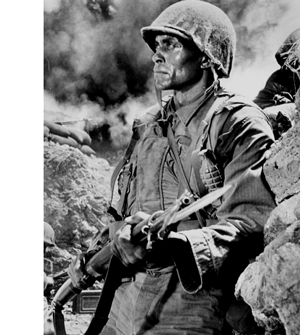
Movie lovers love Pork Chop Hill's large cast. Most any fan will find a few favorites here. A lot of actors we wouldn't expect to play tough guys are given well-written showcase parts. Harry Guardino is a private upset that he's overdue to be rotated out of combat; his papers haven't come in yet. Guardino had been kicking around Hollywood for eight years, and just two years later would be playing Barabbas in a 70mm epic. Rip Torn gets to flex his Texas drawl as a fellow Lieutenant offering aid to Clemons; his film debut was three years earlier for Elia Kazan, and he'd join Guardino as Judas in the same Nicholas Ray film. George Peppard had been on TV and in one other movie and would break out in his next assignment, Vincente Minnelli's Home from the Hill. Peppard has a few good lines but is mostly noted hauling around a .30 caliber machine gun. Note to extras - volunteer to carry the small props. Black actors James Edwards and Woody Strode receive equal billing and representation. Edwards' efficient Corporal is not as memorable as Strode's terrified Pvt. Franklin, who spends much of the picture trying to keep his head down, or find some excuse to escape combat. It's a class move, as most pictures around this time would treat a black actor as a token hero. Then again, I would imagine that prejudiced viewers might see Pvt. Franklin's cowardice as typical. Korea was reportedly the first U.S. action with regular black divisions, and there were problems when white officers were in command. By contrast, George Shibata's Nisei Lt. is a straight-arrow warrior with more on the ball even than Lt. Clemons... actor Shibata went to West Point with the real Joe Clemons. 1 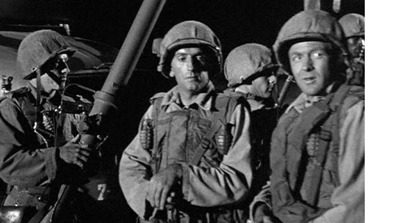
The un-aggressive Norman Fell helps Harry Guardino with the film's light comic relief. Robert Blake wins our approval in a memorable part as a little guy who keeps fighting and helping out even after he's wounded. A lot of us non-combat ready viewers certainly identified with him. Also acquitting themselves with honor are capable Lieutenants Charles Aidman, Bert Remsen and Martin Landau (his first film); and Chuck Hayward, Gavin MacLeod and William Wellman Jr. as various soldiers in distress. And fighting the good fight (for a decent part) is our cult favorite Harry Dean Stanton (just above, center), who makes the best of his one half of a dialogue line and two or three walkthroughs. The well-organized production begins with Sam Leavitt's cinematography. The ugly, battle scarred hill locations match well with well-matched interiors for dugouts on the trench lines. The night-for-night battle scenes are excellent -- Leavitt knows how to suggest minimal light while letting us see everything. Director Milestone's instructions must have been to pre- lay a mile of dolly tracks, because we do a lot of creeping up hills with our nervously advancing troops. The negotiation scenes aren't as impressive, and neither are the shots of Chinese propaganda warfare experts in their cave lair, broadcasting morale-deflating speeches to our troops. We're told that the snide 'give up Joe' musical programs are accurate enough, but the flat visuals are suited for a Republic serial. 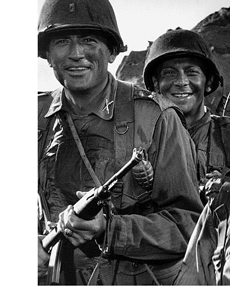
The only scenes where I think Pork Chop Hill misses the boat are the Panmunjom negotiations. The insolent Communist representative stares at the ceiling in boredom as a U.S. Admiral (Carl Benton Reid) pleads and loses his temper. The Commies are meant to appear as rude monsters, but the scenes instead make us look like hotheads, expecting the Commies to fold their hands and smile just because we're 'the good guys'. The movie takes the position that we shouldn't be negotiating with the bastards in the first place... so technically it's hard-line --- which is different than right-wing. In any case, most Korean War movies were made as outright propaganda by people like Howard Hughes ... the vicious One Minute to Zero comes to mind. For its year, Pork Chop Hill gives us a close-up look at how desperate and frustrating the combat must have been for those on the front lines. The Olive Films Blu-ray of Pork Chop Hill is an excellent, nearly flawless HD transfer of this older combat favorite. The widescreen B&W images really convey the dusty feel of trench warfare. The sound is in good shape as well. I've never forgotten the insinuating voices that come through the Reds' public address system.... as a child I associated them with the scary mystery of 'inscrutable Red brainwashing.' One would think that such tactics would just make our soldiers fight harder and meaner. Leonard Rosenman's music score is serviceable but begins on a wrong note, with a ticky-tacky pseudo-oriental theme. TCM has repeated the claim that scenes cut from the film were used under the opening credits. To me they look like outtakes from the same scenes we see later in the film. Some of the twenty minutes United Artists allegedly eliminated could have been introductory scenes before Lt. Clemons enters -- the hill had been contested since October '51, and Clemons' entry into the fight didn't happen until April 17, '53. In a movie with so many characters, it's likely that everybody's scenes got trimmed to some degree -- we lose track of a couple of the characters. 
I personally saw Pork Chop Hill under unusual circumstances. My namesake Uncle Glenn was visiting us in Hawaii and he and my father (who almost never went to the movies) took me to see it at the base theater a block away. The audience was enthusiastic. Afterwards I remember my Uncle -- an ex-Marine -- making comments to the effect of, 'those Washington politicians need to get out of the way so we can fight'. I remember the words but I sure didn't know what he was talking about. Now it seems like my Uncle read the movie's message accurately.
On a scale of Excellent, Good, Fair, and Poor,
Pork Chop Hill Blu-ray rates:
Footnote:
1. And if you look closely, a very young Clarence Williams III is in for a bit as a message runner.

Reviews on the Savant main site have additional credits information and are often updated and annotated with reader input and graphics. T'was Ever Thus.
Review Staff | About DVD Talk | Newsletter Subscribe | Join DVD Talk Forum |
| ||||||||||||||||||